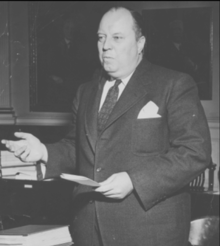Mosby Perrow Jr.
| Mosby Perrow Jr. | |
|---|---|
 |
|
| Member of the Virginia Senate from the 12th district |
|
|
In office 1943–1964 |
|
| Preceded by | Carter Glass Jr. |
| Succeeded by | Robert S. Burruss Jr. |
| Personal details | |
| Born |
March 5, 1909 Lynchburg, Virginia |
| Died | May 31, 1973 (aged 64) Lynchburg, Virginia |
| Nationality | American |
| Spouse(s) | Katherine Duane Wingfield |
| Education | E.C. Glass High School |
| Alma mater | Washington and Lee University |
| Occupation | Lawyer |
| Known for | Perrow Commission: end of "Massive Resistance" |
Mosby Garland Perrow, Jr. (born March 5, 1909, – May 31, 1973) was a Virginia lawyer and state senator representing Lynchburg, Virginia . A champion of Virginia's public schools, Perrow became a key figure in Virginia's abandonment of "Massive Resistance" to public school desegregation, including by chairing a joint legislative committee colloquially known as the Perrow Commission.
Perrow was born in Lynchburg, Virginia to Dr. Mosby G. Perrow and Louise Polk (Joynes) Perrow. Perrow graduated from E.C. Glass High School and received a Bachelor of Arts degree from Washington and Lee University. As a student, he was involved in campus politics and spearheaded Lewis F. Powell, Jr.'s winning bid for student body president. Perrow received his law degree from Duke University.
On June 24, 1938, Perrow married Katherine Duane Wingfield of Lynchburg. They had three children: Duane Payne (Mrs. Wistar Palmer Nelligan), Mosby Garland Perrow III, and Edmund Wingfield Perrow. The Perrow family lived in the Fort Hill neighborhood of Lynchburg and at Staunton View Farm in Campbell County, Virginia.
Perrow practiced law in Lynchburg as a partner with the law firm of Perrow and Rosenberger. He was an active member of Memorial United Methodist Church, and a member of the board of directors of several private corporations and belonged to various civic organizations in the Lynchburg area. He enjoyed his time on his farm overlooking the Staunton River raising crops, hogs, and briefly, black angus.
Perrow was elected to the Virginia Senate from the 12th Senatorial District in 1943 and served continuously until 1964. He was active in local and state Democratic Party circles for many years and was a leading advisor to several Virginia governors. His committee assignments included Rules, Finance, County, City and Town, Organization, Moral Social and Town Welfare. His special committee assignments included the Denny Commission, which paved the way for improving the state's school system; the Commission to Study the Home for Needy Confederate Women, and the Virginia Advisory Legislative Council.
...
Wikipedia
